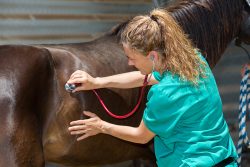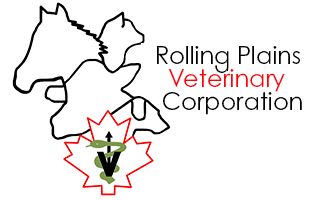 Not just any mobile vet can handle the unique healthcare needs of a horse. At Rolling Plains Veterinary Corporation, we can, and we’re ready to ensure your horse receives the highest level of expert oversight.
Not just any mobile vet can handle the unique healthcare needs of a horse. At Rolling Plains Veterinary Corporation, we can, and we’re ready to ensure your horse receives the highest level of expert oversight.
From prenatal care to teeth floating, lameness examinations to Coggins Testing and beyond, your horses have access to best-in-class care no matter their health needs. Whether you own a show horse or a work horse, we’ll ensure it gets the preventive and critical care it needs to stay happy, healthy and strong throughout its lifetime.
From the Pleasure Horse to the Working Horse; in shows, rodeos, racing, or pleasure, our ability to do in clinic and on farm X-rays and Ultrasound has allowed us to perform better health evaluations. Video endoscopy has given us sight – allowing us to examine the horse’s guttural pouches and respiratory tract for infections and structural damage. This technology even allows us to look inside the horse’s stomach to help diagnose stomach ulcers.We have PowerFloats that enable us to do faster and more accurate dental floats.
Besides routine examinations, pet microchipping, pre-purchases exams and surgeries; we also offer early pregnancy diagnosis through ultrasound. Whether in clinic, on farm or referred to a mobile vet, our focus is the health and well being of your horse.
St Claude and Notre Dame Vet clinics are fully equipped with outdoor pens for overnight stays in Saint Claude, Rathwell, Haywood, and Manitoba, MB. Inside there is a standing stock for examinations and surgery, as well as box stalls for in-clinic patient care and monitoring.
We have two fully equipped work vehicles to enable us to perform examinations, diagnostic tests and surgery on farm.
Our mobile vets also provide a wide range of products and pet medications for your equine needs. An in-clinic laboratory, as well as access to the provincial lab, provides our clients with many diagnostic options. Contact us at St. Claude Veterinary Clinic today!
Mobile Vet
Not every vet is mobile. And not just any mobile large-animal vet can handle the unique challenges of equine health care. At Rolling Plains Veterinary Corporation, we can, and we are ready to make sure that your horse’s health receives the highest level of veterinary oversight.
Whether it is prenatal care or teeth floating, lameness exam or Coggins testing or beyond, Rolling Plains Veterinary Corporation can provide your horse with best-in-class veterinary care no matter what their health challenges. We treat work horses, we treat show horses, and we treat horses kept for their owners’ pleasure. No matter what your horse’s mission in life, we will ensure that it gets the preventive and acute care it needs to stay healthy, happy, and strong its entire lifetime.
Rolling Plains Veterinary Corporation has the capacity to do in-clinic and on-farm x-rays and ultrasound. We can do visual endoscopy to examine the horse’s respiratory tract and guttural pouches for structural damage and infections. Endoscopy even allows us to look inside the horse’s stomach compartment to detect and diagnose stomach ulcers. We can do faster, accurate dental floats with Power Floats.
We are available for pre-purchase exams, microchipping, health maintenance exams, and surgery. We also offer early detection of pregnancy with ultrasound. We use years of equine veterinary experience and state-of-the-art equipment to offer the best possible veterinary care for your horse.
Our St. Claude and Notre Dame Vet clinics are fully equipped with outdoor pens for overnight stays in Haywood, Rathwell, and St. Claude, MB. We have indoor standing stock for examinations and surgery, as well as box stalls for in-clinic patient monitoring and care.
Two fully equipped work vehicles to enable us to perform diagnostic examination and testing as well as surgery on your farm.
Rolling Plains Veterinary Corporation’s mobile units can deliver the full range of products and pet medications your horses need. We maintain complete in-clinic laboratory access to the provincial laboratories to provide our clients with every modern diagnostic option. Contact us at St. Claude Veterinary Clinic today!
Frequently Asked Questions
Q. What should I do to prepare my horse for a visit from the vet?
A. The most important thing you can do to get your horse ready for an on-site visit from Rolling Plains Veterinary Corporation is to catch your horse and put him in a secure area. This helps everyone involved stay safe, and it also helps you veterinarians stay on schedule.
It is also important to make sure there is no mud, straw, or other debris on their coat. This makes it easier for your vet to see any skin conditions or swelling that may need treatment. If your horse is getting vaccinations during the vet’s visit, it is important to have clean skin ready for safe injection.
Veterinarians realize that some horses are more skittish about human contact than others, but if they have never treated your horse before, and your horse has handling issues, you need to let your veterinarian know before the visit starts. It is always easier to work with a horse that is comfortable being handled.
Q. What records will my vet need to see before working on my horse?
A. Veterinarians keep records on every horse they see, but in emergency situations, they won’t have a chance to review them. It helps to have a vaccination, farrier, tooth check, deworming, and dental check records available when your vet arrives, and also a list of any allergies to medications or reactions to vaccines. Your vet may also need to know the kinds of grain and forage you feed your horse, as well as how much and how often, and any notes about prior vet visits and surgeries. Vets see many animals every day, and sometimes a memory refresher is helpful.
Q. What do I need to have on hand in case the vet needs to restrain my horse?
A. You need to have at least a halter and a lead rope ready to restrain your horse. Have the pen, barn aisle, or other area around your horse clear of obstructions in case your horse moves suddenly during the examination or during a procedure.
Q. How often do horses need to be seen by a vet?
A. Even healthy horses need wellness checks once a year. Horses more than 20 years old need to be checked twice a year to treat age-related diseases as soon as possible.
Q. How do I give my horse “horse pills?”
A. Horse pills, also known as boluses, as well as drenches and pastes, are given by mouth. Find the toothless gap directly in front of your horse’s molars and behind your horse’s incisors. Hold your horse’s head down with one hand while inserting the thumb of your other hand in this gap. With a firm grip, pull your horse’s tongue though the gap, and hold it gently outside its mouth.
You can now use a balling gun to administer the “horse pill” by placing it behind the top of the tongue. Always lubricate the bolus with vegetable oil or petroleum jelly to keep it from getting stuck in the horse’s throat. Hold your horse’s head slightly up until the medication is swallowed.
Q. Where do I give my horse injections?
A. Most injections are given in the horse’s neck or thigh. Your veterinarian can show you the correct procedure for injecting medication or vaccine into your horse. Rolling Plains Veterinary Corporation can provide you with high-quality, reliable vaccines and medications for treating your horse. Expired medications or medications that have not been stored properly are more likely to cause adverse reactions in your horse.
Q. Do veterinarians expect to get paid at the time of service?
A. It is always best to be ready to pay your horse vet with cash, cheque, or credit card at the time of service. A hot cup of coffee or a cold drink may be appreciated, too.
